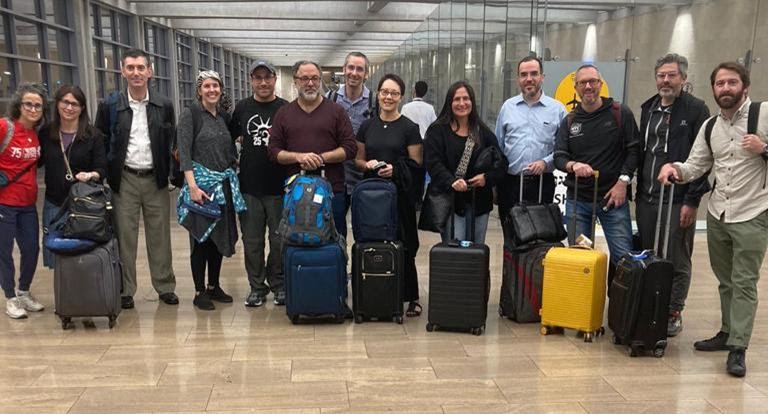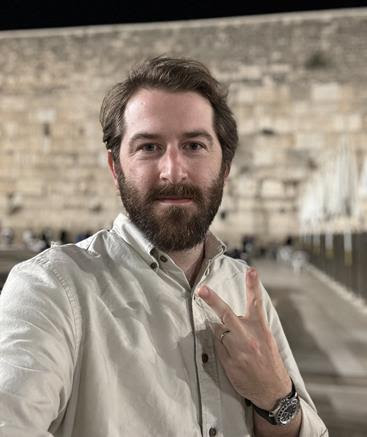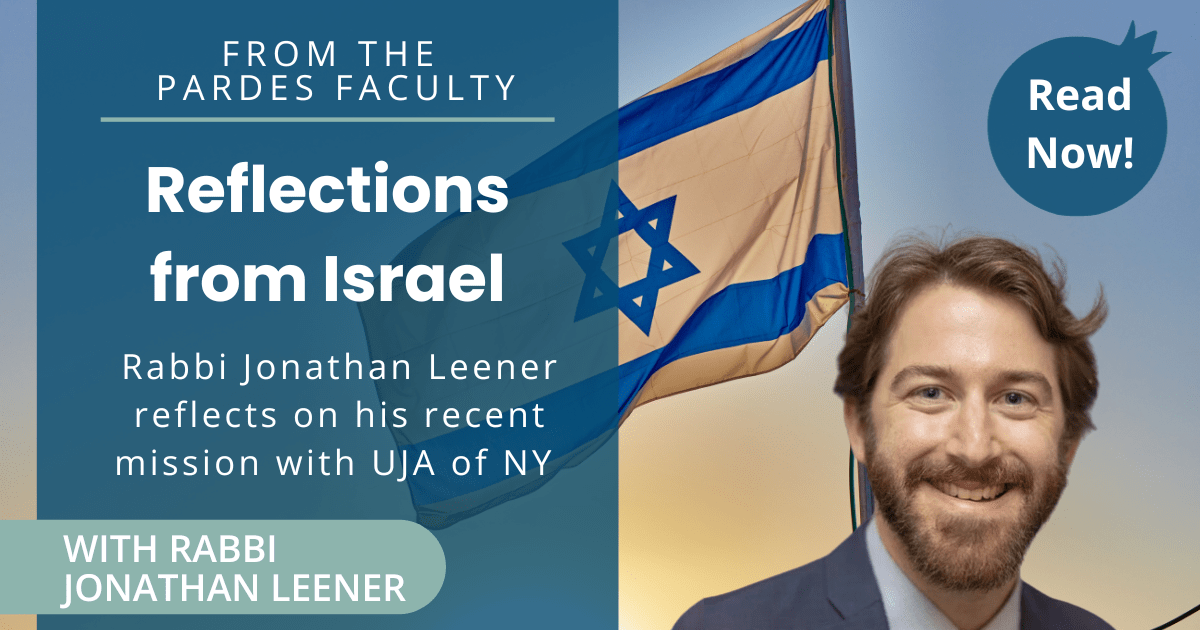By Rabbi Jonathan Leener
The following remarks were initially delivered at Prospect Heights Shul on Shabbat, November 4th.
Rav Tzadok Ha-Koen of Lublin taught, “The place where a person runs in times of crisis — when the pain reaches to the depth of the soul — that place is their essence.” I feel blessed that I was able to represent our community with the 300,000 Israelis who have returned to Israel since the start of the war as a way of affirming Israel as the soul of the Jewish people. Most people run from war, Jews strangely run into it.
I am grateful for the opportunity extended to me by the UJA of NY to journey to Israel alongside 28 rabbis from the metropolitan area, representing a diverse array of denominations: 11 Orthodox, six Conservative, five Reform, and one Reconstructionist leader. Our group comprised individuals from synagogues and organizations across all five boroughs of New York City, as well as Long Island and Westchester.
Our mission was straightforward yet profound. We aimed to express our solidarity, offer support (chizzuk), and share the stories of the people we encountered with our respective communities. Whenever someone inquired about our presence, their reactions were deeply emotional. Many broke down in tears, while others greeted us with warm, heartfelt hugs. Israel is currently grappling with profound and primal pain, but amidst this suffering, the unwavering spirit and resilience of the Israeli people is on full display.

My 48-hour whirlwind trip to Israel began with a literal bang. As our plane descended for landing, sirens blared, and rockets were intercepted in mid-air by the Iron Dome all around us. I had an aisle seat, but passengers by the window could witness the interception of the missiles. Upon landing at Ben Gurion, the pilot informed us that we would be taxiing quickly from the runway to minimize our time on the plane in case more rockets were fired. It was evident right away that this would be a profoundly different Israel trip. This was nothing like the Israel experience I had just enjoyed in June when Faith and I took the kids. Even before my feet touched the ground, I found myself grieving for an Israel that seemed to have vanished into the abyss of October 7th.
The unfolding events in Israel at this moment are truly unprecedented in its history. Israelis are grappling with the challenge of putting these experiences into context. While some American commentators try to draw parallels to historical atrocities such as the Holocaust or various pogroms, it’s crucial to note that those horrifying episodes took place in the diaspora, outside of Israel. The foundation of modern Zionism is firmly grounded in the belief that Jews can only attain true security in their own homeland. In his work “The Jewish State” (1896), Herzl expressed, “The Jews have but one way of saving themselves — a return to their own people and an emigration to their own land.” In even stronger terms, Vladimir Jabotinsky stated, “Liquidate the diaspora or the diaspora will liquidate you.” Zionism and the security of the Jewish people within Israel are inherently interconnected.
The loss of 1,400 Jewish lives and the taking of 240 hostages pose an existential challenge to the very essence of Zionism and the core of Israeli identity. Consequently, Israel finds itself immersed in a complex struggle today, contending with challenges emanating from Gaza and Lebanon while reevaluating its own mythic self-perception. Many of the pillars that have traditionally defined them, sources of pride such as the strength of the army, the brilliance of their intelligence community, and their cutting-edge technology, all fell woefully short at the moment they were needed most. However, this deconstructed Israel is seen by many as an opportunity. A collective pioneer spirit, reminiscent of the one that birthed the nation decades ago, is resurging. The sentiment of ‘We’re going to build a new Israel, a better Israel, a stronger Israel’ echoed throughout my time there.
During a meeting with Israeli intellectual Micah Goodman, he emphasized the shattering of the perception of stability and security in Israel, arguing that the aftermath of the war represents an incredible moment of possibility. It’s a chance for the State’s 4th generation, typically characterized by a fading awareness of both the fragility and preciousness of the gift of a state, to genuinely rebuild the nation. Currently, the cold civil war that had dominated the country leading up to this conflict is temporarily on hold, and Israel is experiencing a rare sense of unity, with everyone working together.

Notably, the subject of “judicial reforms” was conspicuously absent from discussions, except for a mention when two volunteer leaders from the Jerusalem Civilian Command Center, who are political rivals running against each other in upcoming elections, touched upon it as a point of pride, highlighting their collaborative effort. The significant question that looms is whether, once the dust settles, Israel can transcend the toxic politics that had brought the country perilously close to an actual civil war. If they succeed in doing so, the vision of a new Israel will not remain a mere dream. However, if this toxicity were to resurface, the prospect of a new Israel could turn into a nightmarish scenario.
The sense of unity in Israel is profoundly moving and will leave a lasting impact on my connection to the Jewish people and my role as a rabbi. Many of the societal divisions have dissolved, and the transformation is remarkable. Secular Israelis from Tel Aviv are now driving to Bnei Brak to collect food prepared by Hasidic women for the soldiers, a gesture that seemed impossible just three weeks ago. Speaking of the Hasidim, they too have undergone a significant shift in their relationship with the broader nation. For a long time, they had remained on the periphery of Israeli society, but as I mentioned earlier, everything is changing. Israeli flags now proudly fly in ultra-Orthodox neighborhoods and on city streets. Men from the Haredi community are now actively enlisting in the army. Since October 7th, over 2,000 young men from this religious community have voluntarily joined the service. Additionally, many more Haredim have mobilized to set up aid operations aimed at assisting soldiers and embattled communities.
Regarding Prime Minister Netanyahu and the government, they have lost the support and confidence of the Israeli people. Describing their response to this crisis as “incompetent” would be a kind assessment. The overwhelming sense of betrayal experienced by the populace is striking. However, instead of dwelling on this, Israel has demonstrated incredible mobilization, largely driven by civilians and volunteers.
Since the onset of the war, 130,000 Israelis have been displaced from their homes and are now refugees within their own country. These individuals require essential items like clothing, supplies, and food since they had no time to prepare. Volunteers from all over the country have tirelessly worked to ensure these needs are met. Furthermore, the challenges of displaced populations extend to child and medical care, and these issues become increasingly critical.
On our first morning there, we visited Shalva, an organization that offers world-class services, supports families, and promotes social inclusion for individuals with disabilities. Shalva is an inspiring institution under normal circumstances, but during wartime, its impact and contributions have multiplied significantly.

Families who have been evacuated with children with disabilities can no longer access their usual services. In response, Shalva has swiftly stepped in to provide these services to hundreds of children. In a matter of days, these children have been made comfortable, allowing their parents a much-needed respite as their children are well cared for. Shalva has also opened its doors to provide classroom space for typical schoolchildren from communities like Naveh in the south, who were evacuated to hotels in Jerusalem and required a space for their classes to continue.
Later that day, we visited the Dead Sea. Initially, I was puzzled about our destination, but it quickly became apparent that nearly 15,000 evacuees are now residing in hotels in the area, as all other hotels have reached full capacity. These hotels are divided into two categories: “seriously psychologically wounded” for individuals from places like Beeri, a name and location etched heavily into our minds and hearts, having lost nearly 10% of its over 1000 residents with approximately 30 more kidnapped, and “average psychologically wounded” for those who “simply” had to hold the handle of their safe room doors shut for approximately 12 hours.
Within these hotels, volunteer social workers and psychotherapists are tirelessly counseling and supporting these traumatized evacuees for nearly three weeks, with very little respite. Once again, it’s essential to emphasize that all of this incredible support and organization is being carried out by volunteers, not the government.
The hostage situation is a heavy burden on the minds and hearts of everyone in Israel. We had the opportunity to meet with Rachel and Jon Polin, whose son Hirsh is among the hostages. Hirsh managed to send two text messages, one simply saying “I love you,” and the other “I’m sorry”. Hirsh had been at a music festival with his best friend, who tragically lost his life while heroically attempting to dispose of seven different hand grenades in the shelter they were in. The eighth grenade detonated in his hands, resulting in Hirsh losing his right arm. Fortunately, he was able to quickly tie off the wound while hiding beneath the bodies of others. Since that time, no further communication has been received, leaving us with only a video of Hirsh being loaded into the back of a Hamas pickup truck. Jon and Rachel have already embarked on extensive travels, advocating for their cause and speaking with elected officials from various parts of the world. Their steadfast belief is that with persistent pressure, over time, progress can be made in the right direction. Rachel ended our meeting with a beautiful phrase that is now sweeping the country, עם הנצח לא מפחד מדרך ארוכה, the eternal nation is not afraid of the long road.

Later that day, we journeyed to Yad Binyamin, the yishuv home of the Perez family. Rav Doron Perez serves as the Executive Chairman of the Mizrachi World Movement, and his wife Shelley, along with their four children, reside there. Tragically, both of their sons were involved in the horrors of October 7th. One son, Daniel, is among the hostages, while the other, Yonatan, who was not in the South when the terror attack commenced, immediately took up arms and fought for hours to defend the communities around the Gaza envelope until he was shot in the leg and hospitalized.
Through his account and the stories of many others, it becomes apparent just how much worse the events of October 7th could have been if it hadn’t been for the incredible courage of countless civilians who dropped everything and placed themselves in the literal line of fire. One soldier mentioned that Hammas could’ve had much further advancement into Israel had they not stopped to kill all the civilians. They fought without receiving orders for hours and even days to protect the residents of the region. Yonatan, who sat with our group, was about to leave directly from our gathering to return to his unit, highlighting the relentless determination and bravery around Israel.
The Israeli military’s central role in society during this critical period is evident, with a significant portion of the population being called up or volunteering to serve. The fact that they exceeded their expectations for reservist participation, with around 150% reporting compared to the hoped-for 80%, reflects the depth of commitment and unity in the face of the ongoing conflict. Individuals have been spontaneously showing up at army bases, demanding to be allowed to join the fight, even if they have exceeded the typical age restrictions.
The focus on injured and fallen soldiers is a sad but crucial aspect of the current situation. Our visit to Brothers for Life (BFL) provided us with valuable insights into their mission. BFL envisions a future where every wounded combat soldier receives the care and support necessary to facilitate their return to a fulfilling and contributive life. The transition from being a combat soldier to needing assistance for basic tasks like going to the bathroom is a significant and challenging journey.
BFL operates by connecting an injured soldier with a mentor from Brothers for Life, often someone who has faced a similar injury themselves. These mentors provide support and guidance throughout the entire rehabilitation process, from the hospital bed to the soldier’s eventual return to daily life. This kind of personalized care and support is essential for helping wounded soldiers regain their independence and quality of life after such life-altering experiences.
I also had the opportunity to attend my first military funeral at Har Herzl in Israel. In previous visits to Har Herzl, my focus was on educational aspects, learning about past wars and history. This time, however, I was there to witness and participate in the actual purpose. We attended the funeral of Lavi Lipshutz, who fell in battle earlier in the week in Gaza. Other funerals were also taking place that day. The attendance was substantial, with perhaps even thousands of people present. Many, like us, had no personal connection to Lavi except for the fact that he was a fellow Jew. It was truly heart-wrenching to hear a grandmother eulogize her grandchild. May his memory be a blessing.
The Parsha this week reflects my own anxiety around Israel, mainly the uncertainty of its future in the face of adversity. Avraham is told by Hashem that he will be given the land of Israel and his children will be as vast as the stars in the sky yet the reality of his life seems at odds with that promise, he is unable to have children and he is in constant conflict with his neighbors in Israel. How will God’s promise be fulfilled? This is the power of Avraham. To continue to believe in Hashem no matter what the reality at the given moment. “The eternal nation is not afraid of the long road” this all started with Avraham.

